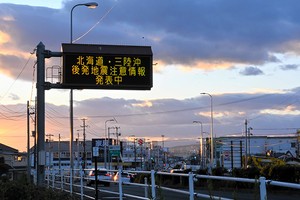By SHINYA SUGIZAKI/ Staff Writer
February 2, 2023 at 15:26 JST
 Jens Stoltenberg, the NATO secretary-general, responds to a question in an interview with The Asahi Shimbun on Feb. 1. (Shinya Sugizaki)
Jens Stoltenberg, the NATO secretary-general, responds to a question in an interview with The Asahi Shimbun on Feb. 1. (Shinya Sugizaki)
Greater solidarity is needed between Japan and NATO to deal with the expanding activities of authoritarian nations, according to the visiting head of NATO.
In a Feb. 1 interview with The Asahi Shimbun, Jens Stoltenberg said “our security is interconnected” and greater cooperation is needed to respond to moves by countries such as China and Russia.
“We see a more dangerous world with the rise of authoritarian powers like Russia, but also China (and) they are coming closer together,” Stoltenberg said.
He said NATO is becoming more engaged in the Indo-Pacific region because if China and Russia work even more closely together, the impact to the Atlantic region would be tremendous.
“China is becoming a more authoritarian regime and trampling on democratic rights, human rights, not only in Hong Kong, but also throughout the nation using advanced technologies to monitor their population in a way we haven't seen before in history.”
Stoltenberg said NATO is moving toward strengthening its support for Ukraine because the consequences to international relations would be dire if it loses the war.
“If (Russian) President (Vladimir) Putin wins, that will send a message to Beijing and other authoritarian regimes that when they use military force and violate international law, they can achieve their goals.”
He said he is aware of the restraints on Japan in providing weapons to Ukraine, but said Japan has provided “substantial support.”
On Jan. 31, Stoltenberg visited the Air Self-Defense Force’s Iruma Air Base in Saitama Prefecture where he inspected the planes used to transport bulletproof vests and drones from Japan to Ukraine.
Stoltenberg also said there is a need for Japan to provide additional support through supplying fuel, generators and medical supplies.
He touched on the fact that Prime Minister Fumio Kishida’s administration has used NATO’s military spending criteria of 2 percent of gross domestic product as the rationale for boosting Japan’s defense spending to that level.
He said the decision to raise spending makes Japan an even stronger partner for NATO.
Stoltenberg visited South Korea and Japan from Jan. 29 until Feb. 1 for talks with South Korean President Yoon Suk-yeol and Kishida about deepening cooperation with NATO.
In 2022, NATO revised a key document called the Strategic Concept, which now says China poses “systemic challenges” to NATO.




















A peek through the music industry’s curtain at the producers who harnessed social media to help their idols go global.
A series based on diplomatic documents declassified by Japan’s Foreign Ministry
Here is a collection of first-hand accounts by “hibakusha” atomic bomb survivors.
Cooking experts, chefs and others involved in the field of food introduce their special recipes intertwined with their paths in life.
A series about Japanese-Americans and their memories of World War II